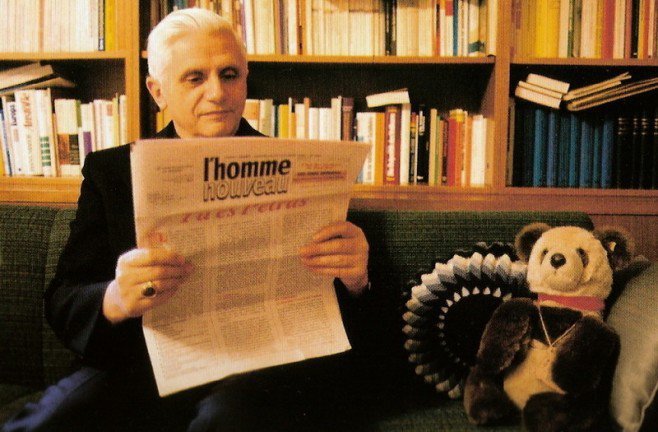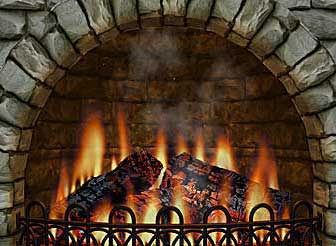
At five times longer than your average blog post, the article from Vatican Radio published yesterday is well worth the read. I was going to blow it off though, even before I realized how long it was. That is, until the following words of our soon to be cloistered Pope emeritus lured me in,
“For today, given the conditions of my age, I could not prepare a great, real address, as one might expect, but rather I thought of chatting about the Second Vatican Council, as I saw it.”
Story time. Who doesn’t like story time?
Sure, we’ve heard comments about Vatican II from his writings in the past. And we’ve read the analysis of others (like this excellent piece by Cardinal Avery Dulles, SJ) who have attempted to tell us what Ratzinger/Benedict was thinking regarding the Council. But how often do you have the chance to listen to the story informally in the form of a chat? Visions of fireplaces dance into my head, while I sense the subtle smell of pipe tobacco wafting past my nostrils. It’s as if a beloved grandfather was visiting and after dinner he said, “come sit down in the study so I can tell you a story.”
I’m all ears, Papa.
Now, 5255 words cannot do justice to the 50 years that have passed since the Council opened. However, you will want to read the chat in it’s entirety. There’s everything from anecdotes to inside baseball. Thoughts on what and who the Church is. Stories of battles fought, and the reasons why they were fought. There are even thoughts on ecumenism spanning Hinduism, Buddhism, and Islam. Did I mention the Trinity? We hear of Him, and His relationship to us, too.
I’ll simply share the concluding paragraphs with you because they are both eye opening and a clearheaded reminder of the difference between “what is,” and what “is perceived to be” when events are looked at through the all seeing eye of the media. Thoughts that remind me that through that lens, the story is “told by an idiot, full of sound and fury, signifying” the wrong thing. Take a look.
I would now like to add yet a third point: there was the Council of the Fathers – the true Council – but there was also the Council of the media. It was almost a Council in and of itself, and the world perceived the Council through them, through the media. So the immediately efficiently Council that got thorough to the people, was that of the media, not that of the Fathers. And while the Council of the Fathers evolved within the faith, it was a Council of the faith that sought the intellectus, that sought to understand and try to understand the signs of God at that moment, that tried to meet the challenge of God in this time to find the words for today and tomorrow. So while the whole council – as I said – moved within the faith, as fides quaerens intellectum, the Council of journalists did not, naturally, take place within the world of faith but within the categories of the media of today, that is outside of the faith, with different hermeneutics. It was a hermeneutic of politics. The media saw the Council as a political struggle, a struggle for power between different currents within the Church. It was obvious that the media would take the side of whatever faction best suited their world. There were those who sought a decentralization of the Church, power for the bishops and then, through the Word for the “people of God”, the power of the people, the laity. There was this triple issue: the power of the Pope, then transferred to the power of the bishops and then the power of all … popular sovereignty. Naturally they saw this as the part to be approved, to promulgate, to help. This was the case for the liturgy: there was no interest in the liturgy as an act of faith, but as a something to be made understandable, similar to a community activity, something profane. And we know that there was a trend, which was also historically based, that said: “Sacredness is a pagan thing, possibly even from the Old Testament. In the New Testament the only important thing is that Christ died outside: that is, outside the gates, that is, in the secular world”. Sacredness ended up as profanity even in worship: worship is not worship but an act that brings people together, communal participation and thus participation as activity. And these translations, trivializing the idea of the Council, were virulent in the practice of implementing the liturgical reform, born in a vision of the Council outside of its own key vision of faith. And it was so, also in the matter of Scripture: Scripture is a book, historical, to treat historically and nothing else, and so on.
And we know that this Council of the media was accessible to all. So, dominant, more efficient, this Council created many calamities, so many problems, so much misery, in reality: seminaries closed, convents closed, liturgy trivialized … and the true Council has struggled to materialize, to be realized: the virtual Council was stronger than the real Council. But the real strength of the Council was present and slowly it has emerged and is becoming the real power which is also true reform, true renewal of the Church. It seems to me that 50 years after the Council, we see how this Virtual Council is breaking down, getting lost and the true Council is emerging with all its spiritual strength. And it is our task, in this Year of Faith, starting from this Year of Faith, to work so that the true Council with the power of the Holy Spirit is realized and Church is really renewed. We hope that the Lord will help us. I, retired in prayer, will always be with you, and together we will move ahead with the Lord in certainty. The Lord is victorious.
Something to keep in mind, as the galvanic event of his abdication is breathlessly reported, and misreported, now and into the future. For while the media loses its way, compromising truth for sizzle and market share, the Truth of the teachings of the Church stand firm and are not hidden. They are not beholden to the hermeneutic of politics, but to the hermeneutic of continuity.












